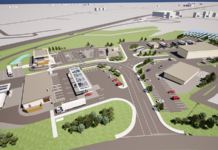
THE latest analysis from Barbour ABI has found that rising interest rates, political uncertainty and continued price inflation has left UK construction spending ‘significantly depressed’ as the new year approaches.
Overall contract awards are down 14% year to date, with most sectors failing to match 2022 through to November. Market confidence also remains low with planning applications down 23% on last October. In the year to October, planning applications trailed 2022 by 16%, with healthcare and industrial suffering the sharpest falls.
Kelly Forrest, Barbour ABI consultant economist, said, “Looking back across 2023, many of the fears we had at the beginning of the year were sadly borne out. The poor contract awards performance we are seeing is set against a backdrop of thousands of insolvencies and businesses in critical financial distress.
“Unsurprisingly, many businesses are expecting more of the same, with applications indicating many are withholding projects in the hopes of better financial news next year. Notably, residential applications were down a shocking 25% versus October last year and contracts were down 23% compared to November 2022.”
Infrastructure has suffered weakness in the year to date, but November was boosted by several major schemes including work on the M5 and the expansion and refurbishment of Leeds Bradford Airport. Spending hit £1.6 billion – a third higher than a year earlier and 38% up on October.
November was also a better month for infrastructure approvals. At £1.9 billion, they were 26% higher than October though they continue to trail 2022 figures by 10%.
Looking ahead, Barbour ABI said approvals in the year to November are down just 1% compared to 2022, suggesting a ‘stable’ outlook for demand. And residential approvals bounced back to £3.7 billion, 3% higher year-on-year, due to large apartment schemes getting the green light.
Kelly Forrest added, “The good news is the underlying demand for construction remains steady, despite the challenges facing the sector, as the housing crisis continues and other factors such as continued demand for green energy and warehousing play into the sector. A decision from the Bank of England to reduce interest rates or a significant decrease in inflation could rapidly swing the pendulum as a result, as could new policies implemented following an election.”








